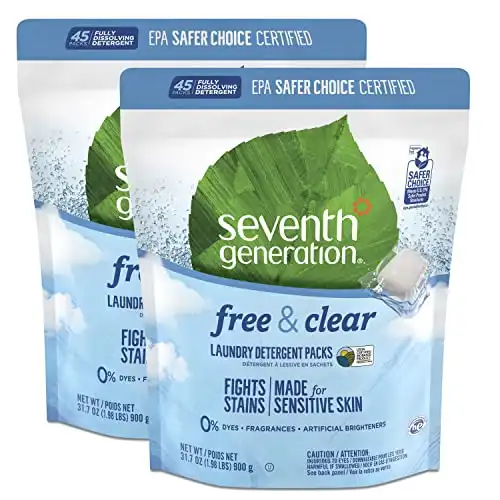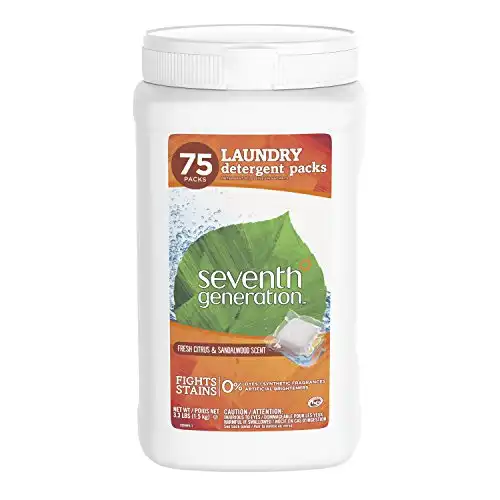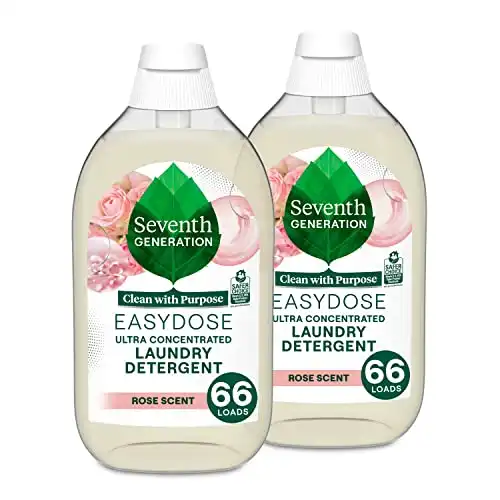- You are here:
- Home »
- Non Toxic Home Poducts »
- Are Seventh Generation Laundry Detergents Eco-Friendly?
Are Seventh Generation Laundry Detergents Eco-Friendly?
With the growing global concern for the environment, consumers are becoming increasingly conscious of the products they use on a daily basis. Laundry detergents, in particular, have come under scrutiny due to their potential environmental impact.
Seventh Generation is a well-known brand that prides itself on producing eco-friendly household cleaning products. In this article, we will delve into the research surrounding Seventh Generation laundry detergent to determine its eco-friendliness.
Understanding Eco-Friendly Laundry Detergents
To assess whether Seventh Generation laundry detergent belongs to the eco-friendly category, it is crucial to understand the key factors that make a detergent environmentally friendly:
- Biodegradability: An eco-friendly detergent should be readily biodegradable, meaning it can break down into natural elements by the action of microorganisms. This characteristic ensures that the detergent does not persist in the environment, minimizing its impact on ecosystems.
- Renewable Resources: The use of renewable resources, such as plant-based ingredients, reduces reliance on fossil fuels and contributes to a lower carbon footprint. These ingredients are generally considered more sustainable and eco-friendly.
- Reduced Chemicals: Eco-friendly detergents aim to minimize the use of harsh chemicals that can be harmful to aquatic life and ecosystems. They should be free from phosphates, optical brighteners, chlorine, and synthetic fragrances, which are known to have detrimental effects on the environment.
- Packaging: The sustainability of packaging materials, such as the use of recycled materials and reducing plastic waste, is an important aspect of eco-friendly detergents.
Seventh Generation Laundry Detergent and its Environmental Impact
Seventh Generation has positioned itself as a leading brand in producing environmentally conscious household products, including laundry detergents. The company claims to prioritize sustainability and transparency in their manufacturing processes.
To evaluate the eco-friendliness of Seventh Generation laundry detergent, we will consider research and available information on the brand’s practices.
Biodegradability
Seventh Generation laundry detergent is formulated with biodegradable ingredients, indicating that it can break down naturally, reducing its impact on the environment.
Independent studies have shown that the surfactants used in Seventh Generation products biodegrade rapidly and are not expected to accumulate in the environment. However, it is important to note that the biodegradability of a detergent can also depend on usage and local water conditions.
Renewable Resources
Seventh Generation emphasizes its use of plant-based ingredients, which suggests a reduced reliance on non-renewable resources. Plant-derived ingredients are generally considered more sustainable and can contribute to a lower carbon footprint.
The brand incorporates renewable resources such as plant oils and extracts, ensuring a more eco-friendly product compared to detergents that rely heavily on petrochemicals.
Reduced Chemicals
Seventh Generation laundry detergents are free from phosphates, optical brighteners, chlorine, and synthetic fragrances. These omissions are positive steps toward reducing the environmental impact of the detergent.
Phosphates, commonly found in conventional laundry detergents, can lead to water pollution and harmful algal blooms. By eliminating these chemicals, Seventh Generation mitigates the potential harm to aquatic ecosystems.
Packaging
Seventh Generation is known for its efforts to reduce packaging waste. They have made progress in using post-consumer recycled (PCR) materials for their packaging and increasing the recyclability of their products.
The brand also provides clear instructions on how to properly recycle the packaging. However, it is essential to note that recycling rates vary depending on regional infrastructure and consumer behavior.
|
$27.98 ($0.31 / load)
|
N/A
|
$48.39 ($0.37 / Load)
|
Read More: Plastic vs Wool Dryer Balls
Ingredients in Seventh Generation Laundry Detergent
Seventh Generation prioritizes transparency by disclosing the majority of its ingredients on its product labels. Here are some of the common ingredients found in their laundry detergents along with their potential environmental impact:
Plant-based Surfactants
Seventh Generation utilizes plant-derived surfactants as the primary cleaning agents in their laundry detergents. These surfactants help to remove dirt and stains from fabrics.
Plant-based surfactants are generally considered more environmentally friendly compared to petroleum-based alternatives, as they are sourced from renewable resources. They have lower toxicity profiles and biodegrade more rapidly, minimizing their impact on aquatic ecosystems.
Enzymes
Seventh Generation laundry detergents often contain enzymes such as protease, amylase, and lipase. These enzymes help to break down and remove specific types of stains, such as protein-based stains, starches, and oils. Enzymes are biodegradable and can enhance the cleaning performance of detergents, allowing for lower wash temperatures and reduced energy consumption.
Sodium Citrate
Sodium citrate is commonly used in eco-friendly laundry detergents as a water softener. It helps to prevent mineral deposits and improve the effectiveness of the detergent in hard water areas. Sodium citrate is a naturally occurring compound derived from citric acid, which can be derived from citrus fruits. It is considered safe for the environment and readily biodegradable.
Sodium Carbonate
Also known as soda ash or washing soda, sodium carbonate is used in some Seventh Generation laundry detergents as a pH adjuster and water softener. It helps to enhance the cleaning efficiency of the detergent.
While sodium carbonate is a naturally occurring mineral, its production through mining and processing can have environmental impacts. However, Seventh Generation’s commitment to sourcing sustainable and responsibly mined ingredients mitigates these concerns.
Essential Oils
Seventh Generation includes essential oils in some of its laundry detergents to provide a pleasant scent without the use of synthetic fragrances.
Essential oils are derived from plants and offer a more natural alternative to synthetic fragrances, which can be derived from petrochemicals. However, it is important to note that some individuals may be sensitive to certain essential oils, and their cultivation can have implications for land use and biodiversity.
FAQs:
Is Seventh Generation laundry detergent tested on animals?
Seventh Generation is committed to cruelty-free practices and does not test its products on animals. They are certified by the Leaping Bunny Program, which ensures that no animal testing is conducted during any stage of product development.
Can Seventh Generation laundry detergent be used in high-efficiency (HE) washing machines?
Yes, Seventh Generation offers laundry detergents specifically formulated for use in both standard and high-efficiency (HE) washing machines. They provide instructions on the product labels regarding proper dosage for different machine types.
Does Seventh Generation laundry detergent contain synthetic fragrances?
No, these laundry detergents do not contain synthetic fragrances. Instead, they may use essential oils to provide a natural scent. Essential oils are derived from plants and offer a more environmentally friendly alternative to synthetic fragrances.
What is greenwashing, and is Seventh Generation guilty of it?
Greenwashing refers to the practice of misleading consumers by making false or exaggerated claims about a product’s environmental benefits.
While Seventh Generation is widely recognized as a brand that prioritizes sustainability and transparency, the perception of greenwashing can vary among individuals. It is important for consumers to conduct their own research, look for certifications, and make informed decisions based on their personal environmental values.
Are Seventh Generation laundry detergents safe for septic systems?
Yes, these non-toxic laundry detergents are safe for septic systems. They are formulated to be biodegradable and do not contain ingredients that would harm or disrupt the functioning of septic systems when used as directed.
Can I use Seventh Generation laundry detergent for all types of fabrics?
These laundry detergents are generally suitable for use on a wide range of fabrics. However, it is recommended to follow the garment care instructions and test a small area before using the detergent on delicate or specialty fabrics to ensure compatibility.
Does Seventh Generation disclose all of its ingredients?
Seventh Generation is committed to transparency and discloses the majority of its ingredients on its product labels. However, due to regulations protecting proprietary formulas, some specific fragrance components may be listed as “fragrance” on the label to preserve the company’s intellectual property.
Can Seventh Generation laundry detergent be used for baby clothes?
Yes, Seventh Generation offers a range of laundry detergents specifically designed for baby clothes. These detergents are formulated to be gentle on sensitive skin and free from harsh chemicals, making them suitable for washing baby clothes.
Read More: Is Laundry Detergent Toxic?
Conclusion
Seventh Generation laundry detergents exhibit several characteristics that align with eco-friendly practices. The brand’s use of biodegradable ingredients, plant-based surfactants, and the absence of harmful chemicals contributes to their eco-friendly reputation. Furthermore, Seventh Generation’s commitment to reducing packaging waste and using recycled materials showcases their dedication to sustainability.
However, a comprehensive understanding of Seventh Generation’s laundry detergent’s environmental impact would benefit from additional independent research specific to their product line. Consumer perception and certifications from reputable organizations, such as the EPA’s Safer Choice program, can provide further insights into the brand’s commitment to sustainability.
When choosing a laundry detergent, it is important for consumers to consider their own environmental priorities and values, while also taking into account regional waste management systems and local water conditions. By making informed choices, consumers can contribute to a more sustainable and eco-friendly future.
Read More: Are Dryer Sheets Safe?
About the Author Kamila Flieger
My name is Kamila, and I'm passionate about researching non-toxic, organic products for the home. I believe it's so important to create a safe and healthy environment for our families, and I enjoy helping others do the same.




